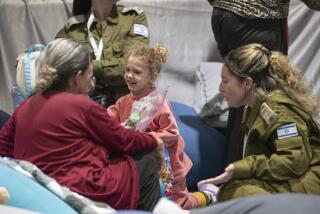Attacks Dim Hopes of Relief for Sarajevo
BELGRADE, Yugoslavia â Serbian rebels pounded Sarajevo with artillery fire Saturday in one of the fiercest attacks of a two-month siege, dampening hopes that an agreement to reopen the city airport for relief flights will mean an end to starvation and bloodshed.
U.N. officials announced Friday that they had secured an agreement with the warring factions for U.N. peacekeeping troops to take control of Sarajevo airport from Serbian guerrillas.
That raised the prospect of lifting a Serbian blockade that has cut off food and medicine to the capital of Bosnia-Herzegovina, where some civilian holdouts are reported to be surviving on roots and pigeons.
But Sarajevo Radio reports on the agreement reflected an atmosphere of dejection following dozens of previous pronouncements hinting that an end to the suffering was near.
The broadcasts noted that unspecified âlocal personnelâ would be allowed to distribute relief supplies under the U.N. agreement, suggesting the Serbian forces holding the airport might be the chief beneficiaries of the aid shipments.
One likely reason the Serbs agreed to the plan for resuming relief flights was that they, too, are running short of food in the tense, bloody battle for control of the city, Western diplomats in Belgrade speculated.
âThe mood in Sarajevo is very pessimistic. Basically, theyâll say there has been a breakthrough when they see a carton of milk on the dining room table,â said one Belgrade envoy with close contacts in the Bosnian capital.
Gen. Satish Nambiar, commander of the U.N. peacekeeping force in Yugoslavia, plans to visit Sarajevo this week to determine how many soldiers will be needed to remove Serbian antiaircraft batteries and ensure safe operation of the airport, sources in Belgrade said.
The 14,000-troop U.N. force was originally based in Sarajevo, but most of the headquarters staff was pulled out last month when conditions were deemed too dangerous in the city.
A skeleton crew of security troops remains in Sarajevo, but humanitarian relief workers have complained privately that the U.N. soldiers are unwilling to help them distribute aid.
The Geneva-based Office of the U.N. High Commissioner for Refugees and the International Red Cross have suspended aid convoys to Bosnia following repeated hijackings and attacks by Serbian guerrillas. Several relief workers have been killed in the ambushes.
Serbian gunmen opposed to Bosnian independence have been trying to starve Sarajevo into submission, as they want the capital and much of the rest of the republic to provide a land bridge with Serbian-held territory in Croatia.
Bosniaâs radical Serbian leader, Radovan Karadzic, has called for annexing Serb-held territory in Bosnia and Croatia to what is left of the Yugoslav federation--Serbia and Montenegro.
Militants loyal to Karadzic resumed shelling of Sarajevo late Friday, shortly after Bosnian government forces granted safe passage out of the city for 800 federal soldiers who had been trapped at the central Marshal Tito barracks. The heaviest attacks were focused on the evacuated barracks, presumably to destroy the tanks, armored personnel carriers and stockpiles of ammunition that the Yugoslav troops were forced to leave behind.
But Sarajevo Radio also reported numerous public buildings and housing blocks were set ablaze by the rain of mortars and artillery fire, described as one of the worst attacks since fighting broke out.
Bosniaâs Serbs, who account for 31% of the population, have been in revolt against Muslims and Croats since a Feb. 29 vote endorsing independence for the republic of 4.4 million. The Serbs, with the help of more than 100,000 former Yugoslav army troops, have seized two-thirds of the republic territory in a brutal campaign that has killed 5,700, wounded 22,000 and driven more than a million--mostly Muslims--from their homes.
More to Read
Sign up for Essential California
The most important California stories and recommendations in your inbox every morning.
You may occasionally receive promotional content from the Los Angeles Times.











